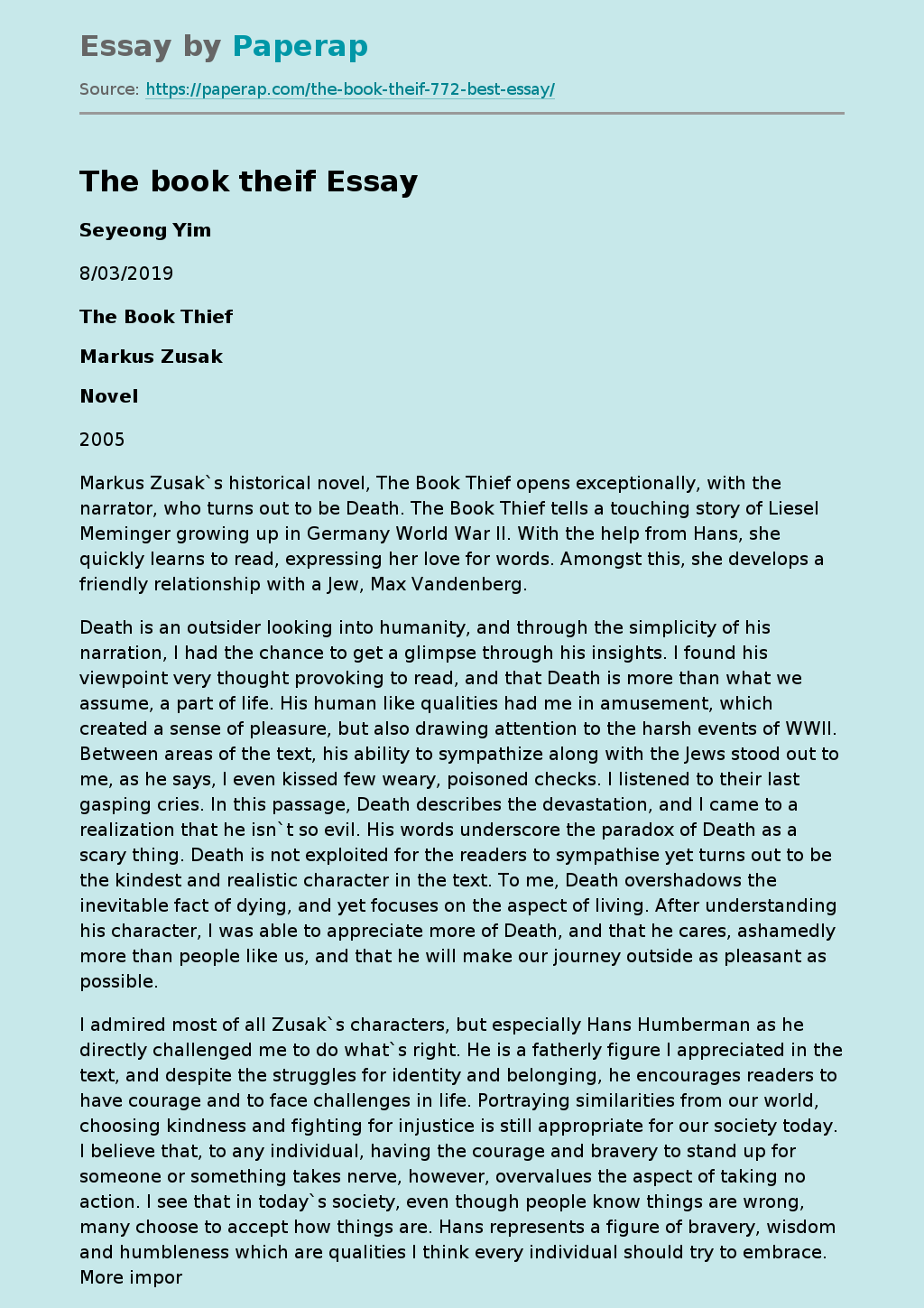The book theif Markus Zusak`s
The following sample essay on Markus Zusak`s historical novel, The Book Thief opens exceptionally, with the narrator, who turns out to be Death. The Book Thief tells a touching story of Liesel Meminger growing up in Germany World War II. With the help from Hans, she quickly learns to read, expressing her love for words. Amongst this, she develops a friendly relationship with a Jew, Max Vandenberg.
Death is an outsider looking into humanity, and through the simplicity of his narration, I had the chance to get a glimpse through his insights.
I found his viewpoint very thought provoking to read, and that Death is more than what we assume, a part of life. His human like qualities had me in amusement, which created a sense of pleasure, but also drawing attention to the harsh events of WWII. Between areas of the text, his ability to sympathize along with the Jews stood out to me, as he says, I even kissed few weary, poisoned checks.
I listened to their last gasping cries. In this passage, Death describes the devastation, and I came to a realization that he isn`t so evil. His words underscore the paradox of Death as a scary thing. Death is not exploited for the readers to sympathise yet turns out to be the kindest and realistic character in the text. To me, Death overshadows the inevitable fact of dying, and yet focuses on the aspect of living. After understanding his character, I was able to appreciate more of Death, and that he cares, ashamedly more than people like us, and that he will make our journey outside as pleasant as possible.
I admired most of all Zusak`s characters, but especially Hans Humberman as he directly challenged me to do what`s right. He is a fatherly figure I appreciated in the text, and despite the struggles for identity and belonging, he encourages readers to have courage and to face challenges in life. Portraying similarities from our world, choosing kindness and fighting for injustice is still appropriate for our society today. I believe that, to any individual, having the courage and bravery to stand up for someone or something takes nerve, however, overvalues the aspect of taking no action. I see that in today`s society, even though people know things are wrong, many choose to accept how things are. Hans represents a figure of bravery, wisdom and humbleness which are qualities I think every individual should try to embrace. More importantly, Zusak communicates with readers to fight for what we think is right and gain redemption for what`s wrong. The novel gave me the courage and inspiration to look for my place in the world, and where I stand in society. The Book Thief clarifies with readers to stick to our inner guidance, and proudly stand tall in our society.
With the dark undertone of the setting and time, real life events and death constantly recurring in the novel, I wondered how The Book Thief was classified as an adolescent literature. I found it difficult to imagine how The Book Thief could be anything but disheartening to read. I couldn`t see how I could relate to events in the text. Between areas of the text, one line drew my attention, Death says Like most misery, it started with apparent happiness. This line draws parallel to the whole novel, as happiness will turn to misery. My ability to understand the hardships of Liesel, Max and Hans had me engaged throughout the novel. It struck me that the friendships that occur during the toughest times, is what makes the conditions of living amongst the carnages of war survivable. Personally, the worst experiences of the characters are more memorable than the happiest. The phase of overcoming them, acts of courage, kindness is what created an impactful and meaningful story for me that all teenagers can relate and sympathise with.
The book theif Markus Zusak`s. (2019, Dec 04). Retrieved from https://paperap.com/the-book-theif-772-best-essay/

